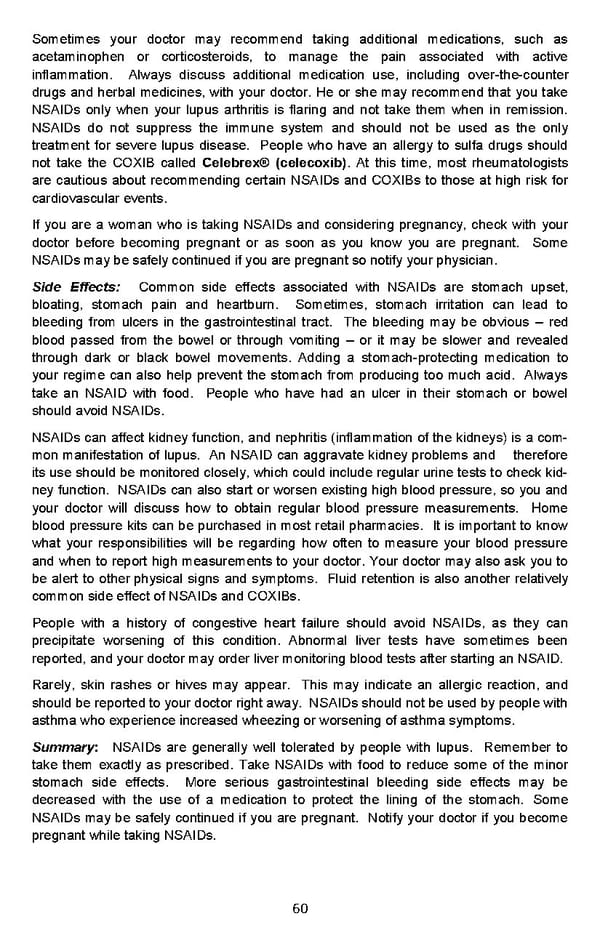Sometimes your doctor may recommend taking additional medications, such as acetaminophen or corticosteroids, to manage the pain associated with active inflammation. Always discuss additional medication use, including over-the-counter drugs and herbal medicines, with your doctor. He or she may recommend that you take NSAIDs only when your lupus arthritis is flaring and not take them when in remission. NSAIDs do not suppress the immune system and should not be used as the only treatment for severe lupus disease. People who have an allergy to sulfa drugs should not take the COXIB called Celebrex® (celecoxib). At this time, most rheumatologists are cautious about recommending certain NSAIDs and COXIBs to those at high risk for cardiovascular events. If you are a woman who is taking NSAIDs and considering pregnancy, check with your doctor before becoming pregnant or as soon as you know you are pregnant. Some NSAIDs may be safely continued if you are pregnant so notify your physician. Side Effects: Common side effects associated with NSAIDs are stomach upset, bloating, stomach pain and heartburn. Sometimes, stomach irritation can lead to bleeding from ulcers in the gastrointestinal tract. The bleeding may be obvious – red blood passed from the bowel or through vomiting – or it may be slower and revealed through dark or black bowel movements. Adding a stomach-protecting medication to your regime can also help prevent the stomach from producing too much acid. Always take an NSAID with food. People who have had an ulcer in their stomach or bowel should avoid NSAIDs. NSAIDs can affect kidney function, and nephritis (inflammation of the kidneys) is a com- mon manifestation of lupus. An NSAID can aggravate kidney problems and therefore its use should be monitored closely, which could include regular urine tests to check kid- ney function. NSAIDs can also start or worsen existing high blood pressure, so you and your doctor will discuss how to obtain regular blood pressure measurements. Home blood pressure kits can be purchased in most retail pharmacies. It is important to know what your responsibilities will be regarding how often to measure your blood pressure and when to report high measurements to your doctor. Your doctor may also ask you to be alert to other physical signs and symptoms. Fluid retention is also another relatively common side effect of NSAIDs and COXIBs. People with a history of congestive heart failure should avoid NSAIDs, as they can precipitate worsening of this condition. Abnormal liver tests have sometimes been reported, and your doctor may order liver monitoring blood tests after starting an NSAID. Rarely, skin rashes or hives may appear. This may indicate an allergic reaction, and should be reported to your doctor right away. NSAIDs should not be used by people with asthma who experience increased wheezing or worsening of asthma symptoms. Summary: NSAIDs are generally well tolerated by people with lupus. Remember to take them exactly as prescribed. Take NSAIDs with food to reduce some of the minor stomach side effects. More serious gastrointestinal bleeding side effects may be decreased with the use of a medication to protect the lining of the stomach. Some NSAIDs may be safely continued if you are pregnant. Notify your doctor if you become pregnant while taking NSAIDs. 60
 Living Well With Lupus Facts Booklet Page 59 Page 61
Living Well With Lupus Facts Booklet Page 59 Page 61